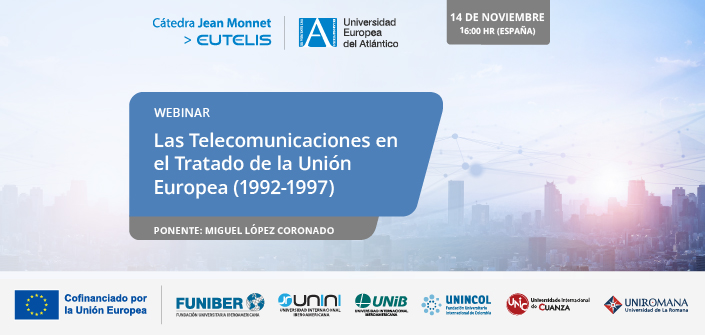The Iberoamerican University Foundation (FUNIBER) will organize, on November 14 at 4:00 p.m. (CET), the webinar: “Telecommunications in the European Union Treaty (1992-1997).”
The session will be taught by Miguel López Coronado and is integrated in the Jean Monnet Chair “Telecommunications Policy in the EU and the Information Society” offered by the Universidad Europea del Atlántico (European University of the Atlantic, UNEATLANTICO).
This session will deal with all the actions proposed by the European Union between 1992 and 1997 and taken by its member states prior to the liberalization of telecommunications on January 1, 1998.
The event is held in collaboration with the Universidad Internacional Iberoamericana de Puerto Rico (International Iberoamerican University, UNIB), the Universidad Internacional Iberoamericana de México (International Iberoamerican University of Mexico, UNINI Mexico), the Fundación Universitaria Internacional de Colombia (International University Foundation of Colombia, UNINCOL), the Universidade Internacional do Cuanza (International University of Cuanza, UNIC), and the Universidad de La Romana (University of La Romana, UNIROMANA).
The conference is free-of-charge and open to anyone interested in the topic. It will be broadcast live in each country where FUNIBER is present. Broadcast schedules are available at this link. Registration is required to participate:
Registration to the webinar: “Telecommunications in the Treaty of the European Union (1992-1997)”
If you are interested in receiving the complete training from the chair, you can find more information at this link. To earn the certificate of achievement and the credits associated with this chair, enrolled students must design an application that gamifies learning about the European Union under the direction and supervision of the teachers.
The objectives of the Jean Monnet Chairs, which are specialized teaching positions in EU studies for university professors and associate professors, include enhance EU studies through specialized programs; conduct, monitor, and supervise research on EU-related topics across all educational levels; train and advise the upcoming generation of educators and researchers; and offer expert guidance to future professionals in European affairs.
“Funded by the European Union. However, the opinions expressed are the sole responsibility of the author(s) and do not necessarily reflect the views of the European Union or the European Education and Culture Executive Agency (EACEA). Neither the European Union nor the granting authority can be held responsible for them.”


